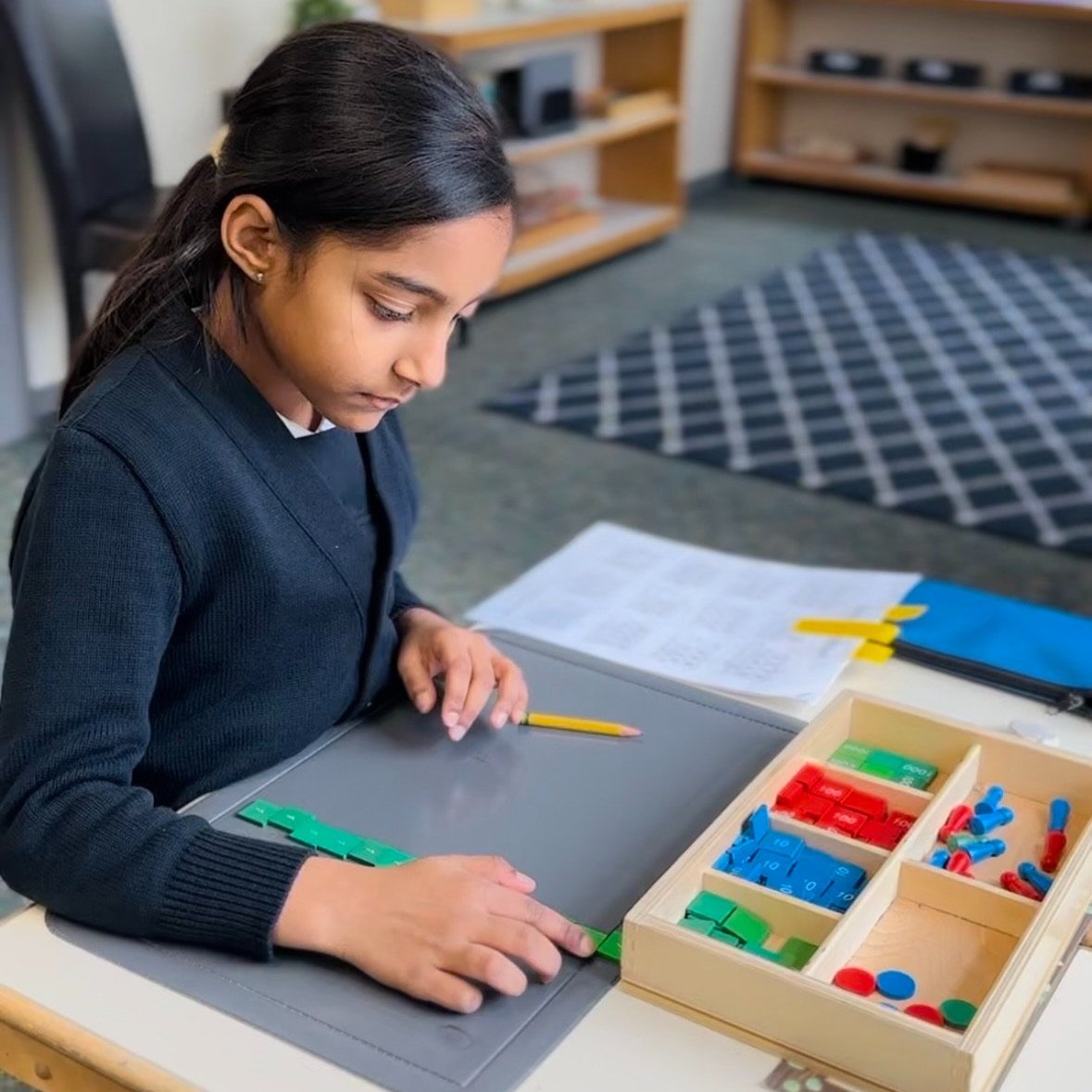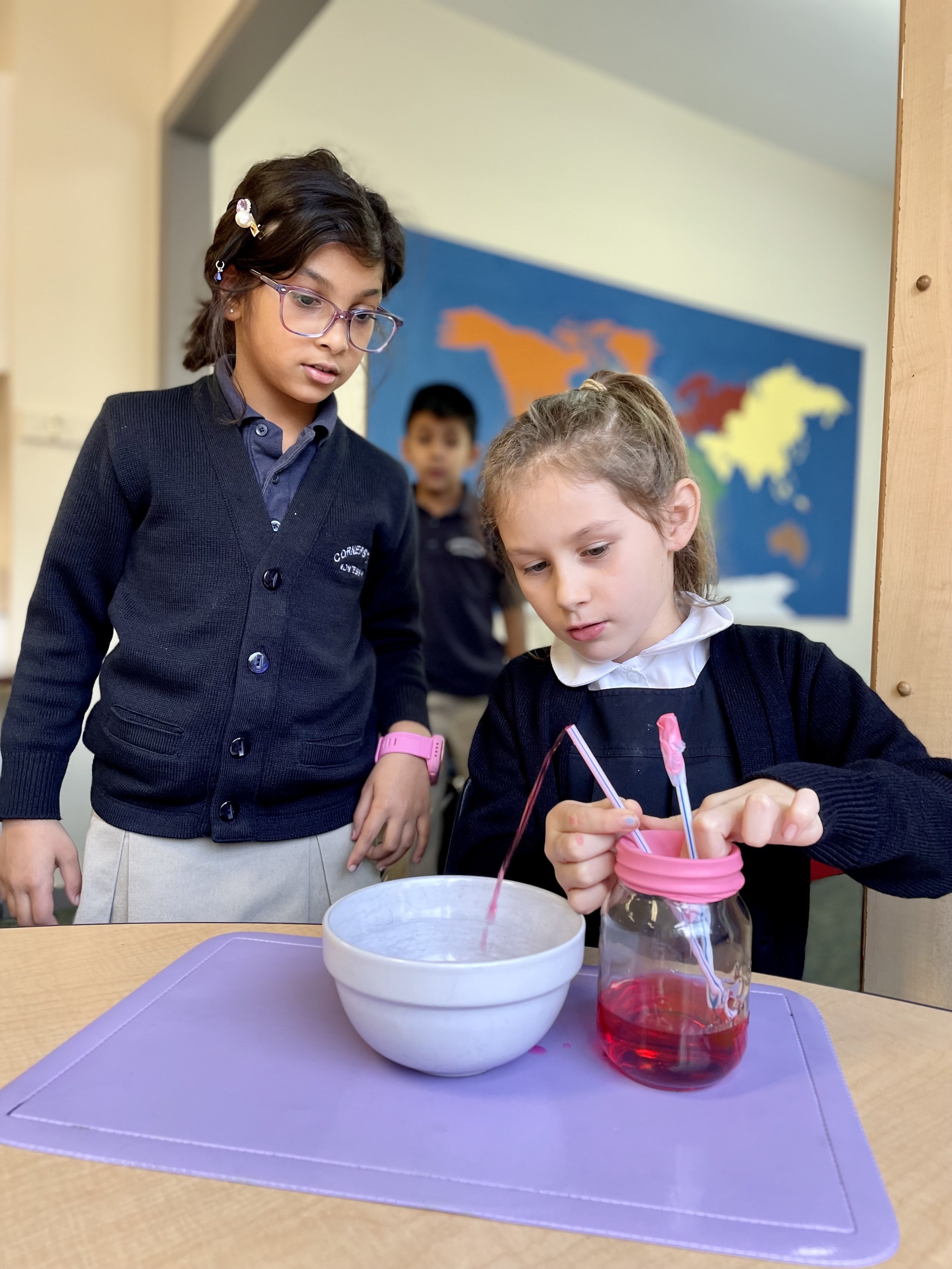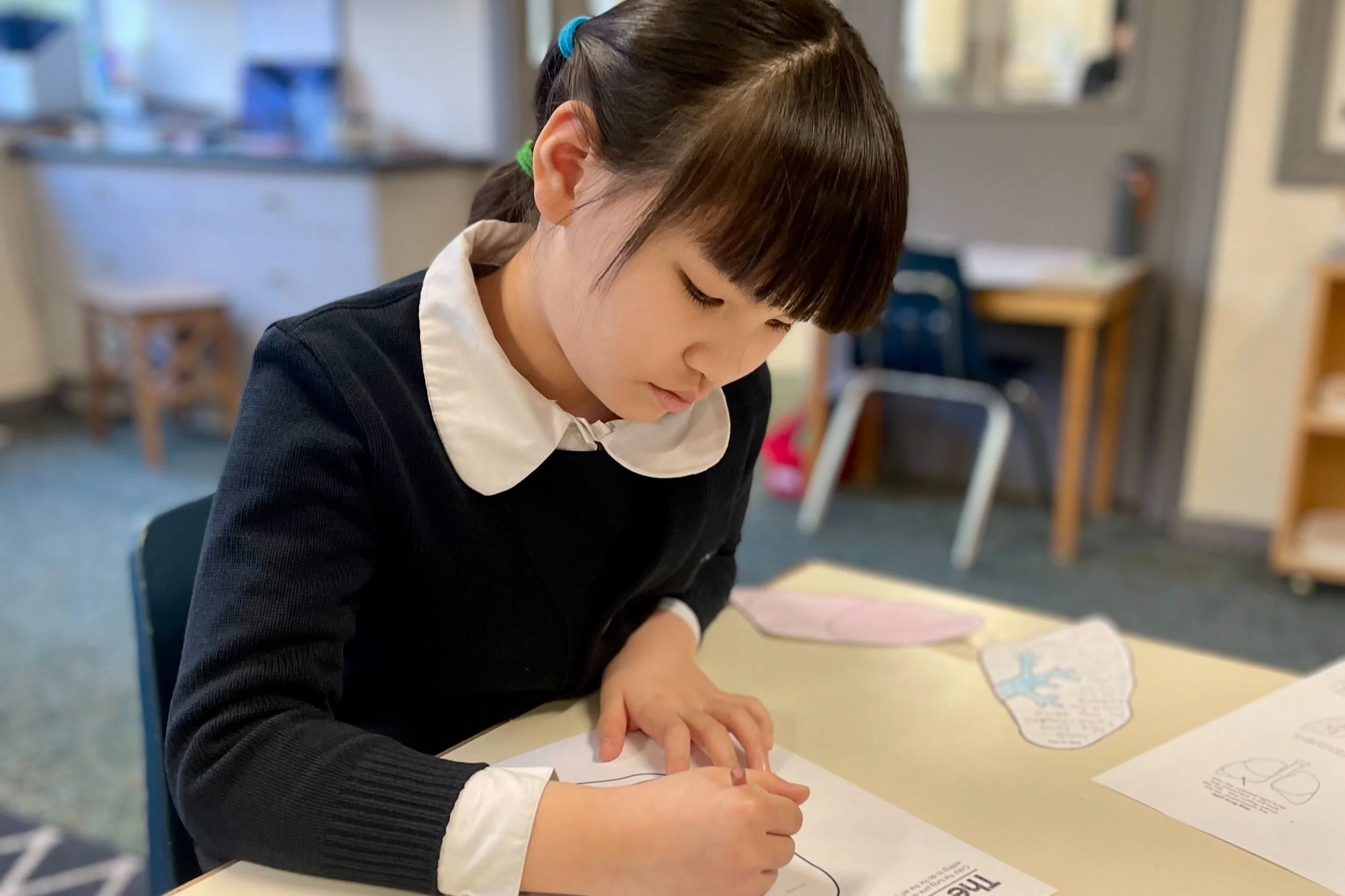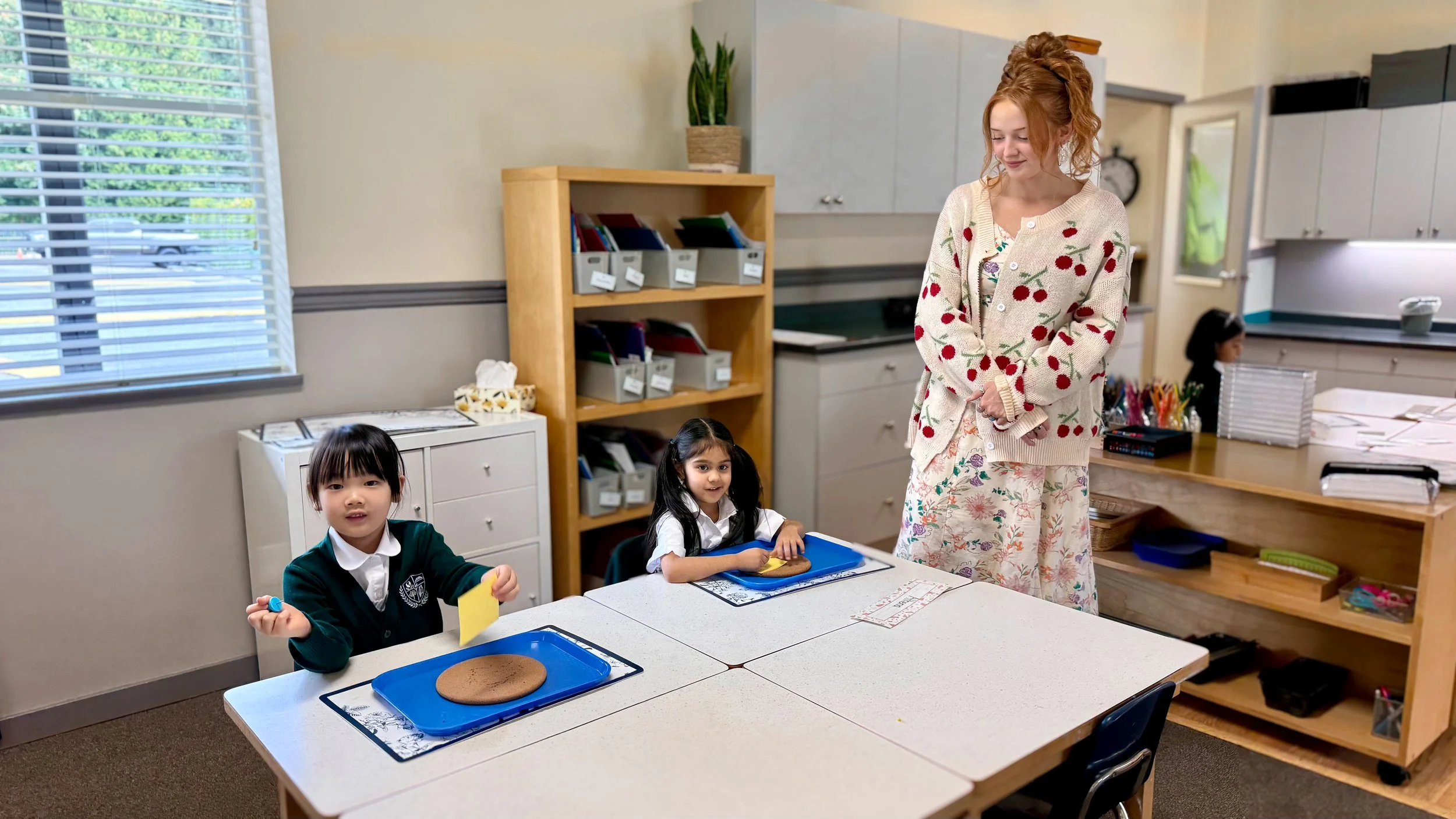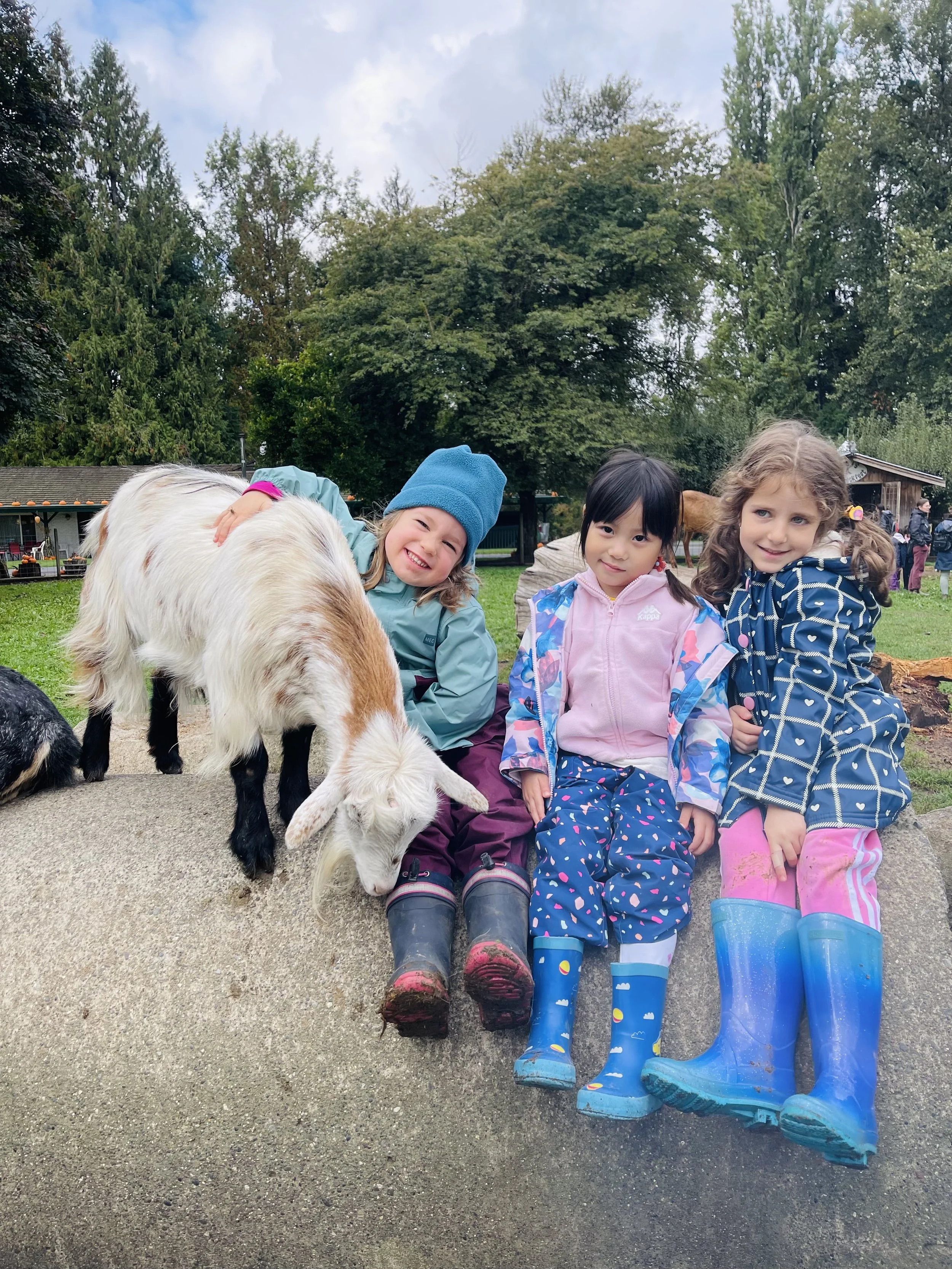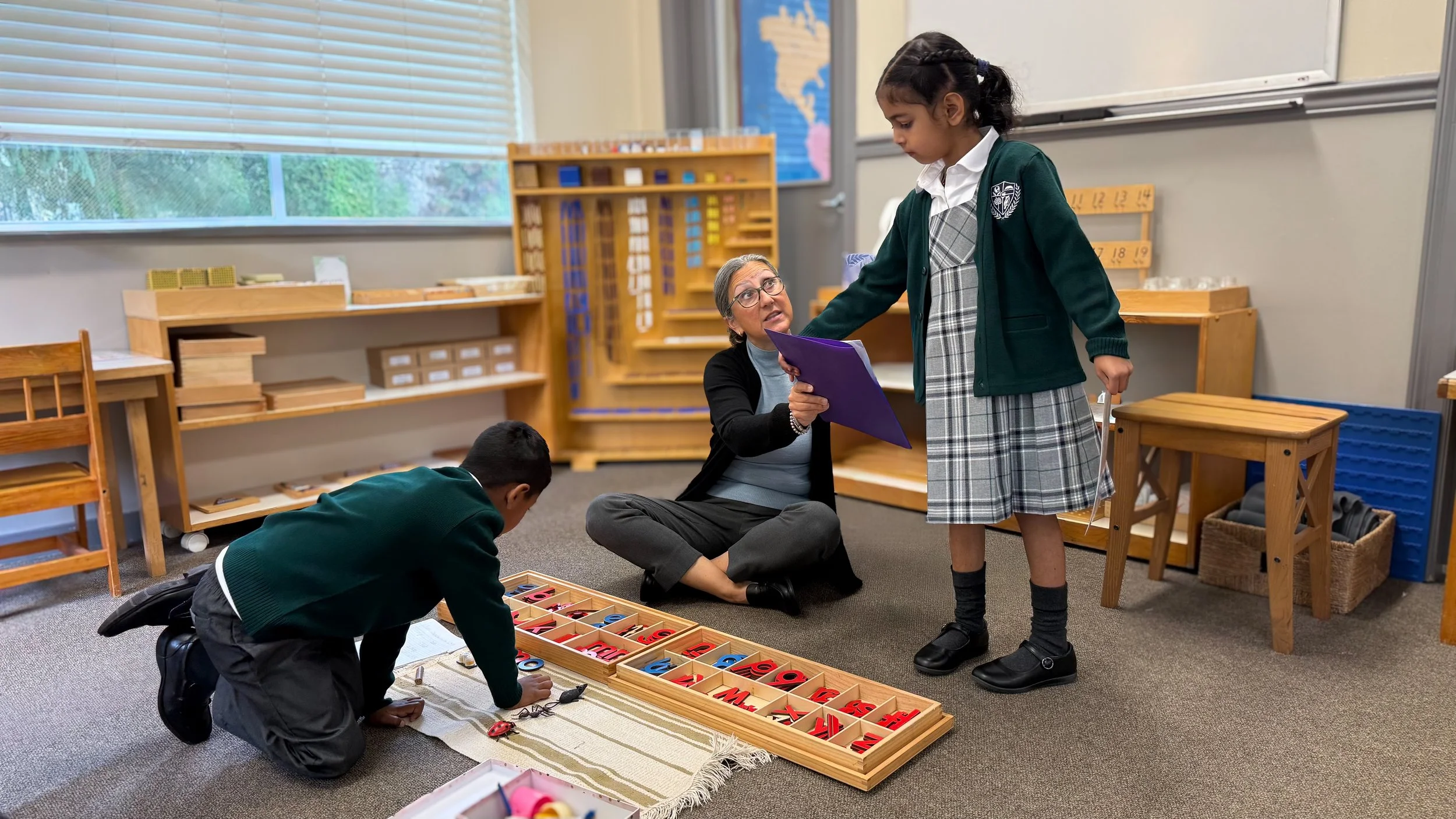
Primary
Enriched Curriculum
The Primary Program at Cornerstone is rooted in the Montessori approach, offering an enriched curriculum that fosters independence, critical thinking, and a lifelong love of learning across all subject areas.
Lessons are enhanced with multimedia resources, Montessori materials, relevant field trips, and a rich variety of hands-on and extension activities designed to reinforce learning and engagement.

Language Arts
In the early primary years, students continue to build a strong foundation in reading, writing, and oral language. Using Montessori language materials, they progress in both decoding (reading) and encoding (writing) phonetic words. As their skills grow, they begin learning phonograms and digraphs—letter combinations such as “sh,” “ch,” “th,” and “ee”—which allow them to tackle more complex words with confidence.
Students transition from labeling and word work to writing simple sentences and short paragraphs. Language Arts is integrated into all academic areas, including science, social studies, and geography. When exploring cultural topics, students are encouraged to express their learning through writing activities that connect ideas across subjects.
Reading is emphasized daily through a combination of group novel studies and independent reading assignments, which are selected to challenge young readers and foster a lifelong love of literature. Each student is required to participate in a home reading program to support fluency and comprehension.
By Grade 2, students begin collaborating on group research projects, learning how to find information using iPads and organize it into their own words. In Grade 3, students take on more independence, conducting individual research projects using both digital and print sources to explore topics of interest and present their findings through written reports.
Mathematics
The Montessori Math program provides students with a strong conceptual foundation that supports long-term success in mathematics. Through hands-on materials, students are able to understand and internalize advanced math concepts from an early age.
Once students fully understand place value in four-digit numbers—such as recognizing that 3,185 = 3,000 + 100 + 80 + 5—they begin exploring the four operations: addition, subtraction, multiplication, and division. These concepts are introduced through the golden bead materials and further practiced using tools like the Montessori stamp game. The materials help students visualize and manipulate numbers, making abstract ideas more concrete and engaging—like solving a puzzle where each concept builds on the last.
In the primary years, students progress through math concepts at their own pace, ensuring deep understanding before moving forward. Students who show a strong aptitude for math are continually challenged with more advanced material. Starting in Grade 2, students begin taking home daily math homework focused on memorizing basic math facts. By the end of Grade 3, they are challenged to have memorized their multiplication tables from 0 to 12. Core operations are practiced throughout the year, while thematic math units—such as graphing, geometry, and financial literacy—are introduced as separate topics to deepen mathematical thinking and real-world application.
Cultural Studies
The Cultural Studies area of the classroom encompasses a range of subjects that complement the Montessori method, including Geography, Science, Botany, and Zoology. These subjects provide students with opportunities to explore their curiosity about the world around them and to make meaningful connections across disciplines.
In the primary grades, students spend a significant portion of each afternoon engaged in Cultural Studies. This time allows for in-depth exploration through hands-on activities, research projects, and creative expression. Some recent highlights include:
Observing ducklings hatch in an incubator set up in the classroom, then caring for them daily until they were rehomed on a local farm.
Collaborative research projects on important historical figures such as Martin Luther King Jr. and Anne Frank, learning how their actions helped shape the world.
Science experiments exploring the difference between physical and chemical changes in matter, sparking excitement through hands-on discovery.
At the end of each unit, students take home a thoughtfully assembled collection of their completed work—often in the form of a booklet or portfolio—along with artwork and reflections related to the topic.
Physical Education
Developing a lifelong healthy lifestyle begins with regular physical activity and a nutritious, balanced diet. Our Physical Education program introduces students to the fundamentals of a variety of sports, allowing them to explore different skills and discover their individual strengths and interests.
Gym classes are held twice a week in a spacious, well-equipped gymnasium located seven blocks from Cornerstone. Each class is transported to and from the facility by a professional bus service, accompanied by their classroom teacher. This dedicated space provides students with the opportunity to engage in a wide range of physical activities in a safe and structured environment.
Fine Arts
The Fine Arts program at Cornerstone includes visual and creative arts, music, dance, and drama, giving students a variety of opportunities to express themselves and explore their creativity. Through hands-on art projects, students work with different materials and techniques to develop their artistic skills and appreciation for visual expression.
In music, students learn rhythm, melody, and basic notation, while also building confidence through singing and group performances. Dance and drama activities encourage movement, storytelling, collaboration, and imaginative play—helping students grow in both creativity and self-expression.
Fine Arts are often integrated into Cultural Studies and other subject areas, allowing students to deepen their understanding of academic content through artistic exploration.
Homework
All students in the Primary Program are assigned regular homework to help reinforce concepts learned in class and build strong study habits.
Students in Grades 1-3 typically complete 10 to 20 minutes of homework each day, which often includes reading and practicing math facts. This daily routine helps develop fluency, comprehension, and foundational numeracy skills.
In Grade 3, students may begin taking home more complex assignments, including writing tasks, independent research projects, and subject-specific review work, as they prepare for increased academic responsibility in the intermediate years.
Parent Communication
Every child is greeted daily with a friendly welcome. Parents and teachers enjoy open communication. Teachers and staff will always make time to discuss issues that are of concern to parents and/or students. Parents attend the following meetings/conferences throughout the school year:
September Parent Meeting
First Term Parent/Teacher Conference
Second Term Student-led Conference
All primary students receive formal report cards throughout their school year, as follows:
Kindergarten: January and June
Primary: December, March and June
Report cards are detailed and informative, reflecting each student’s progress.
Field Trips
Field trips are an integral part of learning at Cornerstone, offering students meaningful, real-world connections to their classroom studies. Teachers regularly plan engaging and educational outings that enhance the Cultural Studies curriculum, bringing topics such as science, history, and geography to life.
In addition to academic excursions, students also enjoy recreational field trips throughout the year, including activities such as ice skating, visiting local farms, and seasonal outings to the pumpkin patch, which promote hands-on learning, exploration, and community building.
All transportation is arranged through a professional bus company, ensuring a safe and reliable experience for students and staff.



